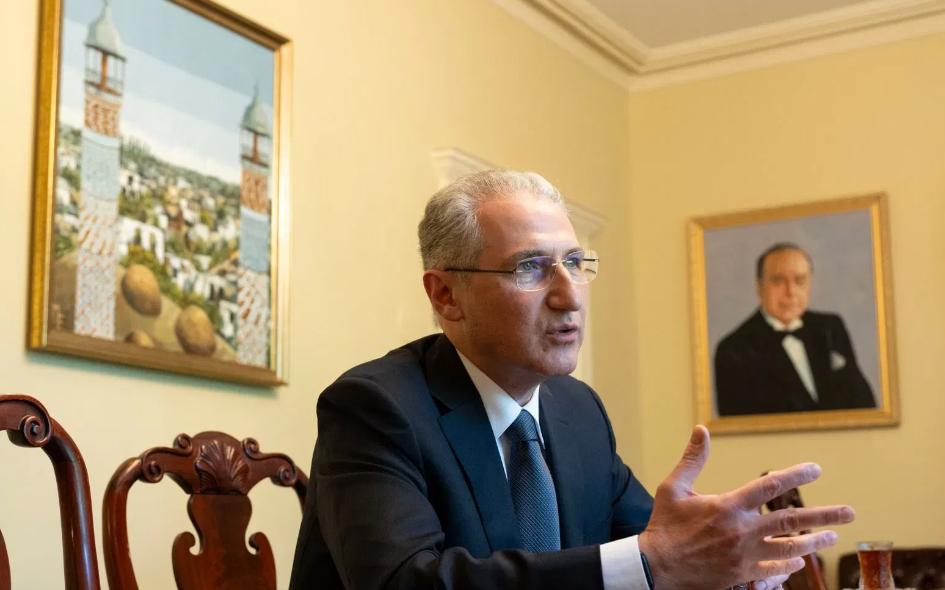Baku as a bridge between the developing and developed world COP29 in the focus of global media
Minister of Ecology and Natural Resources of Azerbaijan Mukhtar Babayev, who has been appointed president of the upcoming COP29 climate conference, gave an interview to the American agency Associated Press. Caliber.Az reprints the piece.
“The man who will run United Nations climate talks this November views the negotiations as a key link in international efforts to curb global warming.”
According to Minister Babayev, the conference in Baku, Azerbaijan, must build on last year’s successful agreement to transition away from fossil fuels, said Mukhtar Babayev, Azerbaijan’s environment minister who will serve as conference president of the talks known as COP29 this fall. And this fall’s meeting must help pave the way for countries to come together in 2025 on beefed-up plans to clamp down on heat-trapping gases, Babayev said.
In a 30-minute interview with the Associated Press at the Azerbaijani Embassy in Washington, Babayev said, Baku is the place to find common ground on how rich countries may provide financial help to poorer nations who generally don’t contribute as much to warming but suffer more from climate change, Babayev said in a 30-minute interview with The Associated Press at the Azerbaijan embassy in Washington.
“We need to consider any possible actions or activities to bring the parties to be closer to each other,” Babayev said. “We consider Baku as a bridge between the developing and developed world.”
“But it’s a bridge under construction. Most past climate negotiations — called Conferences of the Parties or COPs — had years to plan. But because of the geopolitics of eastern Europe, world leaders couldn’t agree far in advance where COP29 would be. That’s critical because the host country holds the presidency and sets the agenda.
Baku was chosen last December, with its selection part of the peace accord between warring Armenia and Azerbaijan.
Successful climate talks often depend on months or years of work by president-designates such as Babayev traveling and working to forge the skeleton of agreements and alliances.
“We had only 10 months for preparation,” Babayev said. Azerbaijan only recently picked a venue, Baku’s large Olympic stadium, to try to fit in the 85,000 or so people who come to these conferences. “A lot of things, they’re not clear now but I think within this year everything will be more or less clear.”

Babayev said his team is still gathering information, meeting people and making connections, but hasn’t yet set specific goals for the conference.
But there is one general goal: More financial help for the developing world to shift to cleaner energy systems, and to cope with the extra heat, floods, storms and droughts worsened by climate change.
“The agenda is to invite all the donors to at least increase their contribution for developing countries,” Babayev said. “Because with the climate change there we are daily faced with all these impacts.”
Babayev pointed outside this week to sunny and sticky Washington weather, which was 78 degrees (25.6 degrees Celsius) , or 8 degrees (4.4 degrees Celsius) warmer than normal. He said Baku had similar temperatures at the moment, also well above normal. Look at Dubai, which hosted last year’s climate talks, and its devastating flooding this week, something Kazakhstan and other countries have also felt, he said.
Babayev was in Washington for the spring meetings of the World Bank, International Monetary Fund and other powerful financial institutions. He and his team were mostly gathering information. The United Nations climate secretary, Simon Stiell, last week called on those financial institutions to make dramatic changes, including debt relief for poor nations, to help fight warming and its impacts.
But Babayev is eyeing another group: The private sector of banks, investments funds and the like.
“We call on the private sector to be very active and responsible about this and to be ready to not delay with the offers, the proposals for climate finance,” Babayev said.
Like the current COP president, Sultan al-Jaber of Dubai, who is the CEO of the Abu Dhabi National Oil Company, Babayev worked for many years in the state-owned oil company in Azerbaijan. Activists and academics have long blasted the influence of the oil industry — one of the major sources of heat-trapping gases — in these United Nations negotiations and that intensified last year when it was run by an oil man. But al Jaber and Babayev said their industry connections are more helpful in getting companies to the table and getting things done.
Babayev said he also hopes that Baku — where the world’s first oil fields were developed in 1846 and Azerbaijan led the world in oil production in 1899 — can show how this “oil and gas country of the past” can show the world a green path with its efforts to ramp up renewable energy, especially wind power,” the article says.








